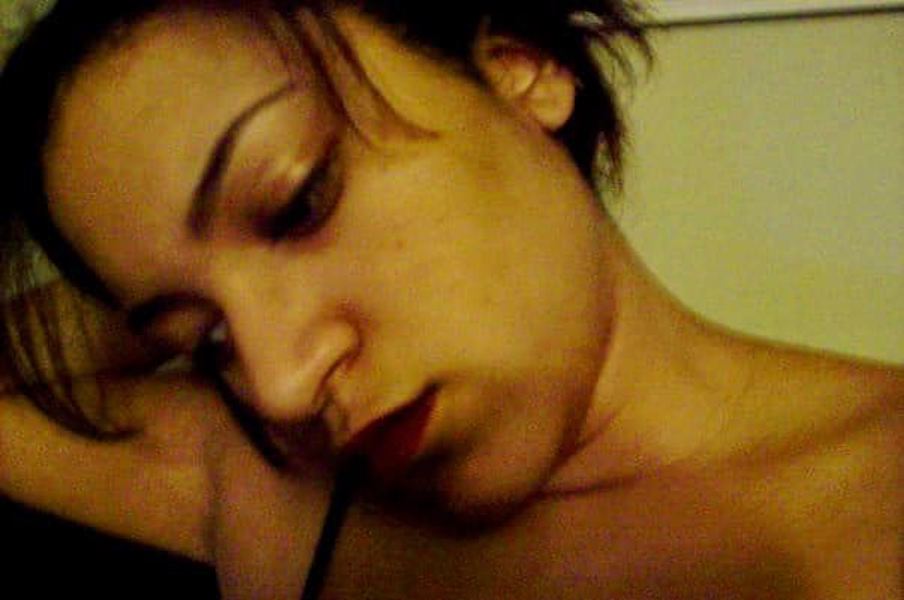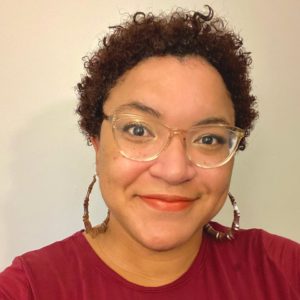I have never been comfortable in theater. Not safe. Not “safer.” Just completely unwelcomed.
We are in a global pandemic. There is movement building on the ground and online that no one in the United States has seen before. This is an unprecedented moment in our history.
Theater, just like the rest of society, will never be able to go back to “normal,” even if there is never another case of COVID-19. There is no going back to something that was built on inequity, inaccessibility, and injustice.
I have seen theaters’ statements on the #BlackLivesMatter movement. They often come packaged with phrases like “We stand with our Black brothers and sisters…,” “Here are our action steps…,” “We have listened, and now it is time for us to act.”
As a Black, light-skinned, AFAB, nonbinary playwright, writer, singer, and would-be director—who has been involved in different online and offline social justice actions—I must say that the theater community loves a good performative statement.
Identity is complex and often painful to express publicly, and Black, Indigenous, and other People of Color do not exist to be show ponies in playbills or stage photos. The same goes for disabled communities and trans, gender-nonconforming, and nonbinary people.
Last year, several theaters promised me that they would respect my identities. But with one or two exceptions, most theater staff did not respect my pronouns, gender, and contributions to the discourse around racism, sexism, and the very things they claim to want moving forward.

Theater will also never be able to go back to the accountability mechanisms many of us embraced over the years before the pandemic and current #BlackLivesMatter public support. We learn more every day about new abuses and methods of disrespect.
What I call “professional fetishization”— touting “inclusive casting and hiring” practices in the name of mitigating against accusations of bias—is the equivalent of saying: “I have a Black friend, and he lets me say the n-word in this play.”
How many theater executives, directors, professors, administrators, and educators have a whisper network around their name warning young artists to “stay safe” and protect themselves?
On a societal level, the system is not working for the people. On an artistic level, theater is not making space for new works, actors and production staff, ideas, concepts, and character developments.
I personally do not feel confident at all that my writing articles, musicals, songs, and scripts will bring me any closer to truly feeling accepted by the community I want to grow in and be accepted by.
Perhaps theaters should turn to creating safe/safer spaces, to protect the rights, opinions, identities, and well-being of the community’s most disadvantaged.
Except safe/safer spaces don’t work. And here’s why.
There is no guarantee that a space will not trigger at least one person—and that one person’s well-being matters. There would need to be multiple therapists or counselors to handle people’s triggered episodes during and after.
Furthermore, what social systems exist to provide mental healthcare to people who leave the space and feel triggered days even weeks, months, years later? How do these people learn to cope?
Theater, just like our larger society, does not have a social/mental health support system in place that is completely financially-, distance-, and space-accessible. So who gets supported afterward? Is any theater truly equipped to ensure the safety of its communities?
Anyone can trigger someone else. Deeming someone “unsafe” because they spoke their truth can be alienating and emotionally violent toward survivors. People cannot control what does and does not trigger them. People should not be asked to leave a space because their experiences trigger someone. Policing language and reactions doesn’t work for society and it never worked in theater.
What is needed instead of safe/safer spaces are accountable spaces
This shift in language and practice—from safety to accountability—will, in my opinion, jumpstart a movement with true potential to offer what literally and historically devalued communities have been asking for, for hundreds of years.
Respect is a given minimum. Disrespect is earned. A call-in is inherently a call to accountability surrounded in love and want for a new relationship to a person, community, or institution. However, we sometimes cannot speak on actual disrespect and abuse until we must, lest we self-destruct. Call-outs can be more visceral and potentially incredibly hurtful to the more institutionally powerful person or group but quite often not as hurtful as that abuse, violence, and disrespect that the marginalized or abused party has experienced. A call-in is inherently an act of love, rooted in transformative justice and the idea that a relationship cannot go back to what it was but can instead become a beautiful new thing that can truly reimagine community. I have tried to call-in several theater executives about misgendering and professional fetishization of race and color, and it is taking all my professionalism and respect for the community to not call them out publicly.
I have had a theater executive accuse me of “gender-judging” in a moment when I did in fact make an error about gender and corrected myself immediately. Meanwhile, this executive has never gotten my pronouns right and doesn’t remember ever accusing the only openly nonbinary person on staff of “gender-judging.” Why am I protecting people who actively disrespect who I am and pretend they don’t, or maybe honestly don’t, know what they did?
One, because I still want to have a job. Two, because I believe that theater spaces can truly start transforming the climate and landscape by having more than an “oops, ouch” policy. It’s often not an “oops” so much as internalized racist, transphobic, sexist, behavior that has gone unchecked.
We, as individuals in this theater community, must be unafraid to have our feelings hurt. We must bear in mind that when we feel attacked, it is often a call-out when a previous call-in was not effective. We must reflect on the privilege that comes with being able to ignore that initial loving gesture. Those with institutional power did not listen in the original key; maybe they will listen in a higher one.
One does not have to externalize an opinion or feeling in the moment, especially if it isn’t fully formulated or one is not ready to speak, when the thought comes up.
Accountable spaces are inherently numerous, continuous, and unending, just like the learning process. Feelings can be valid while also being incredibly harmful and in need of change, so do not walk into a space assuming everything one says resonates or will be welcomed wholly and without caveats.
Abuse and active disrespect toward marginalized people or survivors of abuse and violence should not be tolerated.
However, if one cannot speak their mind eventually, regardless of position, is it an accountable space? Are these “safe” spaces making room for growth?
We have to give people the room to learn and sometimes the resources to learn outside of the accountable space. Accountability is a learning process as well, and while I personally will not do the homework for anyone unless I am paid well, I can point them to the anti-ableism, antiracism, antisexism, anti-homophobia, and anti-transphobia resources that I may have available.
I have sent resources to theaters before, about gender, disability, and race in the workplace and what-not, to no avail. I have also offered my services or recommended the services of others. I don’t even know if they read them. I know they didn’t hire anyone.
Theaters have to drop money on this because otherwise they will not have theaters to return to next year.
An accusation is not the total of who you are or were. The accusations people may have against a theater, group, or individual are not necessarily the sum of their worth or contributions. I have had unhealthy behaviors and toxic opinions that I was called-in and -out on, and I’m sure that it will continue until the day I die.
Accountability is not the pursuit of perfection but the pursuit of justice and respect for all. It is not just about individuals and organizations; it is a systemic issue that has to be handled as such.
The systemic must be addressed interpersonally as well as professionally, electorally, and institutionally because the personal is political, is economic, is professional, is institutional. We have to attack this issue on all fronts to truly see a paradigm shift in public spaces and discourse.
If I were to get to address this misgendering, general disrespect, and hypocrisy in a public forum with these theater executives, I would let them know that their publicly cisgender identities, often their manhood (but cis women have done this too), their non-Blackness or their Whiteness, and their relatively abled existences inform their interpersonal politic and have negatively impacted not just me but many individuals and groups who have DM’d me. I would ask these executives to explain where their assumptions, stereotypes, and their need to professionally fetishize comes from. I would then put them to work.
I can’t make theater executives’ feelings not hurt, and that’s not necessarily something I can nor care to mitigate. No one could or necessarily did care to mitigate my own hurt feelings when being called in and out. I try to take what I dish out because that is what creates interpersonal and communal growth.
I can ask them to not get defensive; to sit with what was said; read and write it out with resources offered; and to come back with questions.
I can ask them to agree to reflect and engage.
I can ask them to acknowledge that ignorance on a subject is understandable because no one has perfect and all-inclusive politics and cultural competencies, and that anyone can learn from their mistakes while also maintaining the expectation that abuse and violence in all forms will not go unaddressed.
I’ve never been comfortable in theater. I’ve felt alive. Never comfortable.
That’s not my fault but it is my mission to change. Not just a step or action, but a process.
I want to fall in love with theater again. I don’t want to be told that I’m wasting my time.
Let’s all feel alive in theater, and accountable to ourselves. Or theater will lose it all.

Artemis Montague (they/them) is a theater educator, playwright, singer-songwriter, and social justice facilitator. They are interested in telling and encouraging the development of stories for and by People of Color, disabled communities, and the LGBTQIA2S community. Their current musical in development via their company, Sunflower Eyes Productions, is called She Sings Me Home (IG: @got_sunflowers).




